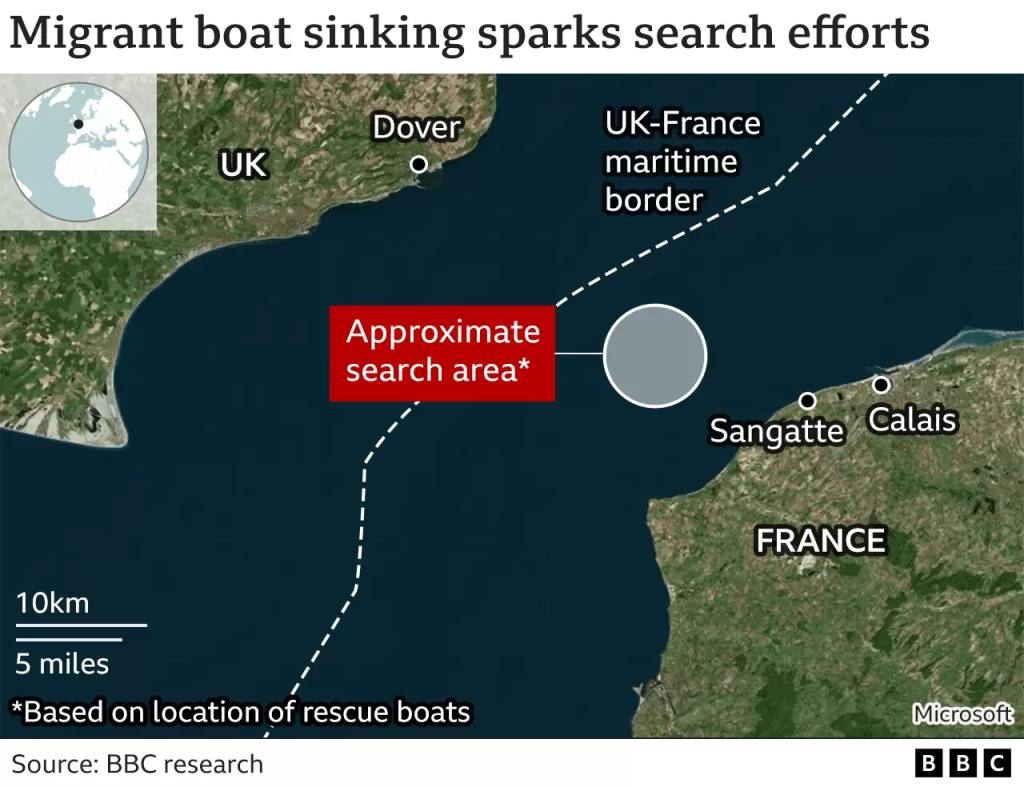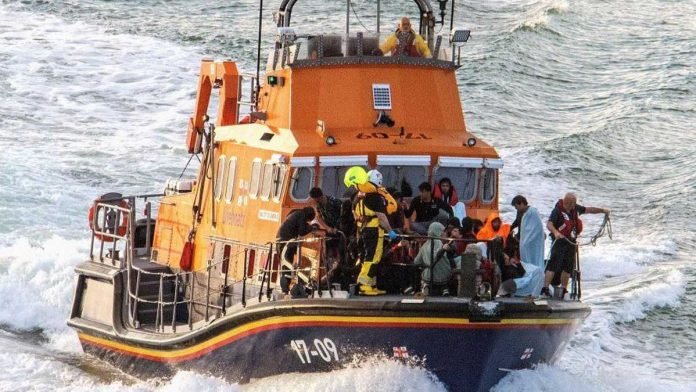Surviving the Unforgiving: Migrant Boat Disaster Claims Lives in Channel
Six dead, two missing after boat sinks in Channel…
The grim incident unfolded in the waters of the English Channel, where the perilous journey of migrants took a tragic turn as a boat carrying them sank off the French coast, resulting in the loss of six lives.
A spokesperson from French coastal authority Premar reported that two people might still be unaccounted for, underscoring the perilous journey that these desperate souls embarked upon.
In a coordinated effort, British and French coastguards managed to rescue around 58 survivors from the turbulent sea. In the aftermath, the sight of individuals disembarking from a lifeboat, some requiring stretchers, in Dover, painted a poignant image of the ordeal they had endured.
The full extent of injuries remains unclear, with the numbers of those rescued fluctuating as more information emerged throughout the day. The victims of this tragedy were Afghan men in their 30s, as confirmed by Philippe Sabatier, deputy public prosecutor for the French coastal city of Boulogne. Most of the survivors, including children, are believed to be from Afghanistan and some Sudanese.
The catastrophe was set in motion when a passing ship alerted authorities to an overloaded boat in distress near Sangatte. When the French lifeboat arrived at the scene, a harrowing tableau unfolded as they discovered people struggling in the water, some desperately crying out for help. The Dover lifeboat, already dealing with another migrant vessel, swiftly joined the rescue operation.
Accounts from the rescue scene spoke of migrants using shoes as makeshift tools to bail water out of the sinking boat. Anne Thorel, a volunteer rescuer, attested that the boat had been overwhelmed by passengers, with the numbers exceeding any reasonable capacity. Jean-Pierre Finot, another French rescuer, highlighted the toll of sea sickness and overloading, rendering the vessels immobile and the passengers at the mercy of the unforgiving sea.
This tragedy brings to the fore a sobering reality. The perilous waters of the Channel have seen rescue crews summon to action seven times this week alone, fueling concerns that smugglers orchestrating these crossings might be utilizing subpar vessels. The precise count of individuals on the ill-fated boat is still unclear, often a challenge due to overcrowding.
Premar reported that UK rescue crews transported around 22 to 23 survivors to Dover, while a French boat carried 36 to Calais. Ongoing search efforts, led by two French boats and aided by a French Navy aircraft and helicopter, aim to locate the two individuals who might still be missing.

Pierre-Henri Dumont, the MP for Calais, noted the ongoing efforts to interview survivors and gather insights into the incident. While the incident occurred within French territory, the collaborative nature of these operations sees British and French teams working together to maximize rescue efforts.
As the tragedy resonates across nations, Enver Solomon, the chief executive of the Refugee Council, expressed gratitude for the rescue efforts while urging the UK government to develop a more structured and compassionate asylum system.
The English Channel, a passage frequented by hundreds of tankers and ferries daily, stands as both a vital maritime route and a perilous stretch of water. Home Secretary Suella Braverman lamented the “tragic loss of life,” a sentiment echoed by a UK government spokesperson who extended condolences to the victims’ families. Stressing the urgency to thwart the people smugglers’ tactics, the spokesperson acknowledged the imperative to break their business model and halt these dangerous journeys.
Natalie Elphicke, Dover’s MP, emphasised the importance of joint patrols on the French coast to prevent overcrowded and unseaworthy vessels from departing in the first place.
Meanwhile, as this tragedy unfolded, another small boat encountered difficulties but was successfully rescued by the UK Coastguard. On a parallel note, images of migrants arriving ashore at Dover highlighted the ongoing challenges of these perilous journeys.
In the past two days alone, over 1,000 individuals have made the treacherous crossing to the UK, reflecting a larger trend. Since 2018, more than 100,000 migrants have navigated these waters in small boats, bearing witness to both courage and tragedy.
This incident brings to mind past fatalities, including the November 2021 sinking of a dinghy that claimed the lives of at least 27 migrants. Such tragedies cast a grim shadow on these journeys, underscoring the profound stakes involved.
Coincidentally, this incident transpired in the wake of concerns over a potential Legionella outbreak on the Bibby Stockholm, a new migrant vessel moored in Dorset’s Portland Port. This dual crisis sheds light on the intricacies and challenges of handling migration and asylum issues, both at sea and onshore.
Support Independent Journalism Today
Our unwavering dedication is to provide you with unbiased news, diverse perspectives, and insightful opinions. We're on a mission to ensure that those in positions of power are held accountable for their actions, but we can't do it alone. Labour Heartlands is primarily funded by me, Paul Knaggs, and by the generous contributions of readers like you. Your donations keep us going and help us uphold the principles of independent journalism. Join us in our quest for truth, transparency, and accountability – donate today and be a part of our mission!
Like everyone else, we're facing challenges, and we need your help to stay online and continue providing crucial journalism. Every contribution, no matter how small, goes a long way in helping us thrive. By becoming one of our donors, you become a vital part of our mission to uncover the truth and uphold the values of democracy.
While we maintain our independence from political affiliations, we stand united against corruption, injustice, and the erosion of free speech, truth, and democracy. We believe in the power of accurate information in a democracy, and we consider facts non-negotiable.
Your support, no matter the amount, can make a significant impact. Together, we can make a difference and continue our journey toward a more informed and just society.
Thank you for supporting Labour Heartlands












